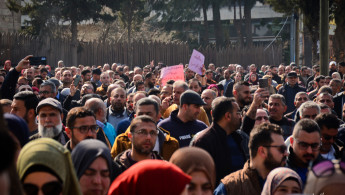As school year begins in the occupied West Bank, Palestinian teachers movement announces new strike
Palestinian students in the occupied West Bank returned to school on Sunday, 20 August, amidst a renewed crisis in the public education sector as Palestinian public teachers announced a new strike.
On Sunday, the Independent Teachers' Movement, the unofficial body leading the public teachers' protests since 2016, said that teachers will stage a partial strike until the end of August, warning of a full-time, general strike in public schools starting in September.
The statement demanded the agreement's fulfilment reached with the Palestinian Authority (PA) in May, following a two-month-long general strike, accompanied by several occupied West-Bank-wide rallies involving thousands of public school teachers.
According to the agreement, the Palestinian government would pay teachers' salaries, including the allowances agreed upon in 2022, following a previous general strike. The PA would also allow the formation of an independent union for public teachers, a demand pending since 2016.
Thousands of Palestinian teachers demonstrate outside the office of the Palestinian Authority's Prime Minister in Ramallah, demanding fulfilment of their overdue moral and financial rights, including the right to full payment of their monthly salary, today. pic.twitter.com/CHDtoxed0n
— Quds News Network (@QudsNen) March 13, 2023
According to Sunday's statement, teachers will attend three of the eight daily classes before leaving their establishments until the end of August. A following full-time general strike will be suspended only if teachers' salaries for August are paid, including the agreed allowances, at the beginning of September, the statement stressed.
"This new strike was announced to ensure the fulfilment of previous agreements, in light of the recent punitive actions by the government against members and leaders of the movement", a coordinator in the teachers' movement, who asked not to be named, said to The New Arab.
[Qassam Muaddi/TNA]
"The education ministry has been transferring teachers who were involved in the last strike away from their schools," the source said. "For example, a teacher in Ramallah city was transferred to a remote village in the west of Ramallah, while the secretary of her school, while others, including myself, were given early retirement, with less than 1000 shekels (US$365) retirement salaries."
"At the same time, the government continues to insist on negotiating through the current, government-controlled union, which indicates that it doesn't intend to allow us to form an independent union, as agreed upon previously," the sources remarked.
"We believe that the government tries to intimidate teachers into abstaining from protesting, but the precarious living conditions of teachers leave us no choice but to continue our actions", they noted.
"Most public teachers have no job security, many are being put on temporary and part-time contracts, and nearly all of us are forced to take a second and some even a third job, to make ends meet", they added.
The Palestinian education ministry has not yet responded publicly to the calls to strike. On Sunday, however, the Palestinian education minister, Marwan Awartani, said in an interview with the local Ma'an sat channel that "students are the ones who pay the price of the interruption of the education process".
"Professional grievances should not come at the expense of students, which is why I do not support calling for a strike at the slightest issue that arises," said the minister.
Palestinian public teachers' protests since 2016 have been described as Palestine's most significant social movement in decades. Currently, some 54,000 Palestinian teachers work in the public education sector.






 Follow the Middle East's top stories in English at The New Arab on Google News
Follow the Middle East's top stories in English at The New Arab on Google News


